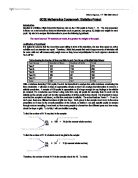My hypothesis of this investigation is that age and intelligence will be the two main variables to influence a person's ability to estimate. I think this because,
- For instance, if I compared a man of 45 and a boy of 15 to estimate, I'd predict that the man would estimate closest. I think this because the man has possibly got more experience than the boy at estimating.
- A person's ability to estimate can be varied by intelligence. For example, if I asked two boys in Year 10 to estimate, I would expect the boy with the better mathematical knowledge to estimate closest. I think this because he would be more able in maths, which would give him a better idea of the actual estimation.
The variables which might affect a person's ability to estimate could be:
- Age: does a person's age affect their estimating ability? Getting hold of older people in the same quantity of 11-18 year olds could be a problem.
- Intelligence: how do we actually calculate intelligence? An average children's intelligence I could record from their maths sets, but what about people older than 18?
- Gender: does being male or female mean you have a greater ability at estimating?
- Occupation: does being a chef mean you have a better estimating ability?
The variables which I could use for estimating are:
- Length: For this I could ask a number of people to estimate a specific length.
- Weight and Mass: For these I possibly could give someone an object and ask him/her to estimate the weight.
- Time: For Time, I could ask someone to count in seconds to ten and tell me when he/she thought ten seconds had past.
All four of these variables could carry out investigations to do with estimating.
The estimating variable, which I have chosen to use for my investigation is length. I have chosen this because I feel it will be the least complicated variable to investigate, therefore it won't cause awkward problems.
A good percentage of youngsters don't have a good perception of weight or mass so this would surely have caused a problem if I'd have chosen weight or mass. As for time, there may be cheating with a watch and I need to be 100% sure I'm recording accurate results.
The variables which I will be investigating to do with the people are:
- Age, Intelligence and Gender
The reason I have chosen not to include Occupation is because I don't believe it would be as significant as the other variables. The type of job a person does, I don't feel would affect their estimating ability in as bigger way as some of the other variables.
When I begin designing the data collection sheet I will have to ensure that the task they are doing is clear and well laid out.
On the sheet there would need to be space to put:
- their age, the full question, space for their answer.
A number of problems could occur, such as:
- cheating: a ruler could secretly be used when I look else where for a moment.
- rules: does the task need rules? Does there have to be a time limit?
Can these problems be overcome? If so, how?
For cheating: I would have to make sure the person didn't have any rulers or equipment on them to find out the actual length.
For rules: I would give a time limit of 30 seconds. I would use a watch to time the estimation. The rules I'd set would be to not cheat, but simply estimate to your full ability.







